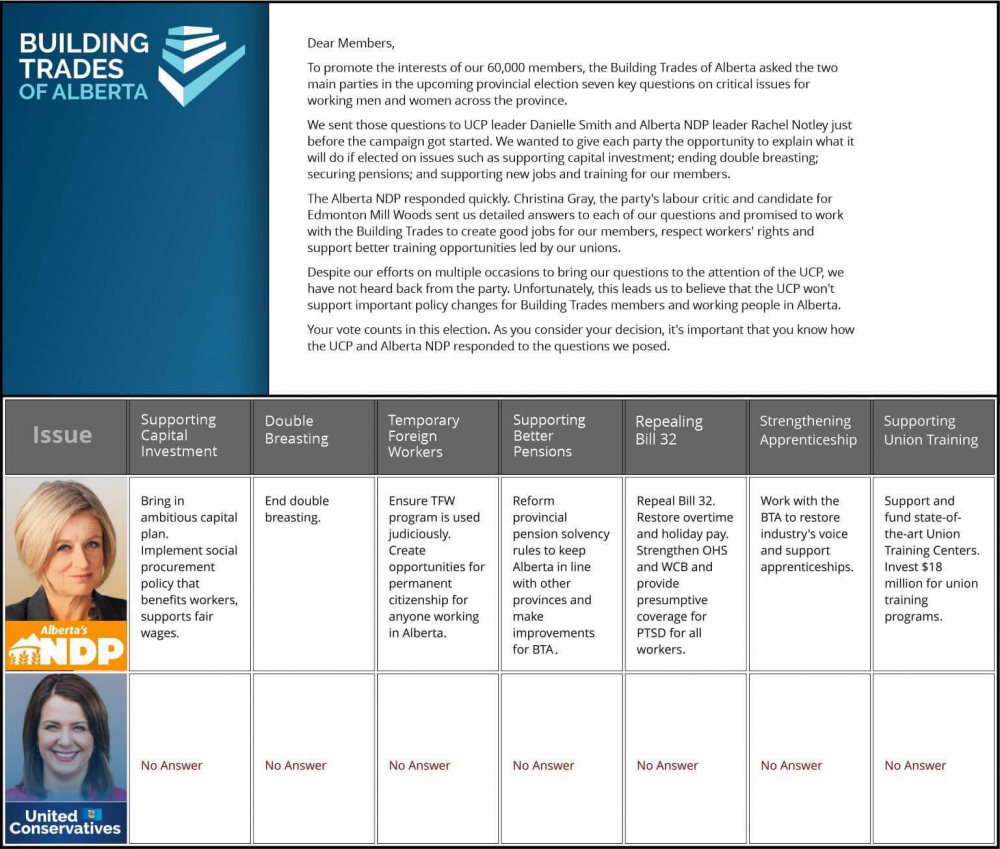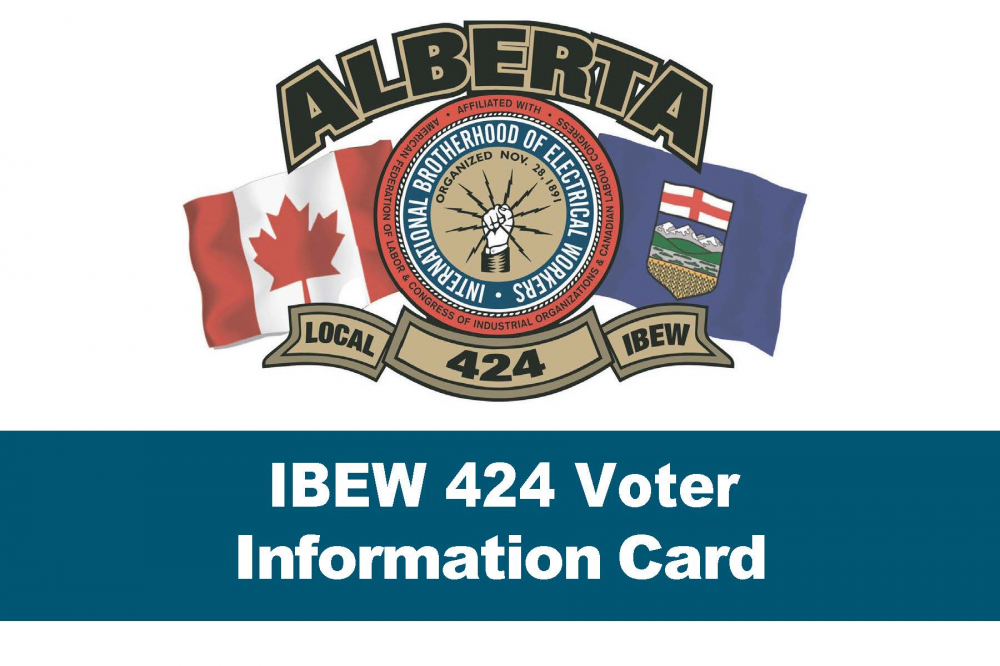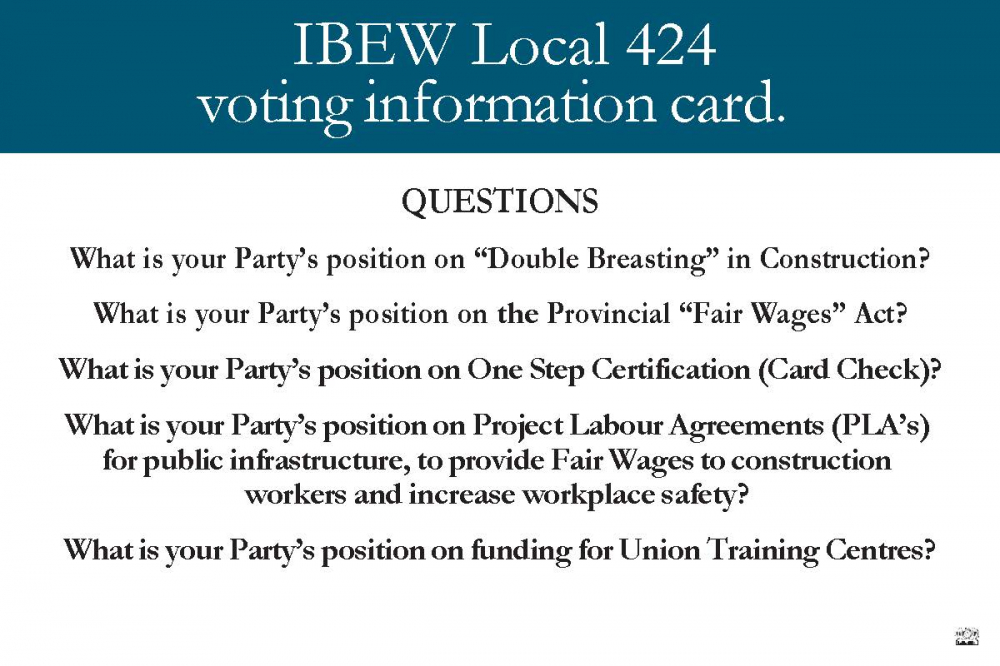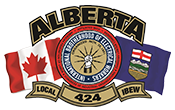Questions For Door Knockers
At IBEW Local 424, we recognize the importance of the upcoming Alberta 2023 provincial election and the potential impact it can have on our members’ lives. We understand that our members have the right to choose their political representatives, and we take no stance on their political choices.
To assist our members in making informed decisions, we have created a list of questions that they can ask provincial candidates. Our questions cover a range of topics relevant to our members, including job security, apprenticeships, fair wages, and the right To fair union organizing efforts.
As a labor union representing electrical workers in Alberta, we believe it is essential to ensure that our members’ interests are represented in the political sphere. We encourage our members to use our list of questions when engaging with candidates to evaluate their policies and positions on issues that matter to our industry and our members.
We are committed to advocating for our members’ welfare and interests, and we believe that providing a tool to evaluate political candidates empowers our members to make informed decisions. We will continue to support our members in every way possible, and we wish them all the best in the upcoming provincial election.
IBEW 424 has sent these questions to the following parties headquarters click the party to see their response-
To Date only the NDP , Liberal Party and the Alberta Party have responded, New responses will be added if and when the party responds.
UCP
Liberal Click Here
Wildrose independence

Voter Information Card Cheat Sheet
Fair Wages Policy
A Fair Wages Policy requires contractors, union, and non-union, bidding on a project to use the union rates. A Provincial Fair Wages policy would stop the race to the bottom on all projects funded by the Province of Alberta, such as schools, hospitals, roads, etc. Cities like Hamilton and Toronto have had Fair Wage policies in effect for decades, and there was a Federal Policy in place until it was repealed by the Harper Government in 2013. A Fair Wage Policy ensures that competition on public infrastructure is based on something other than workers’ wages.
Project Labour Agreements
A Project Labour Agreement (PLA) is a site agreement that can be used for any project funded by the Province, and all trades must sign it, including non-union contractors. By requiring PLAs for public infrastructure, non-union contractors would be bound by the same terms and conditions as the unionized ones, such as wages, benefits, apprenticeship ratios, etc. It is another tool to prevent the race to the bottom and level the playing field between union and non-union contractors.
Double Breasting
Double breasting is when a unionized contractor creates a non-union entity to avoid the terms and conditions of the collective bargaining agreement that were negotiated between the company and the union. By creating a non-union entity, the company starts a race to the bottom with worker wages by having one entity bid against the other. Other provinces have prevented double breasting from occurring by amending their Labour Codes. Some examples of this are Saskatchewan (NDP, 1992) and New Brunswick (Liberals, 2008).
One Step Certification
Under the Alberta Labour Relations Code, a union must obtain support from 40% of the employees working for a company by signing a support card. After this, the union must submit an application to the Labour Board, which will then order a secret ballot vote. However, this process can give the employer an opportunity to intimidate and pressure workers. There have been cases where workers have signed 60-90% of the support cards, but due to intimidation from the employer, they voted against the union. Single-step certification or Card Check, on the other hand, allows the union to apply for certification if 55% or more of the employees sign a support card. It is considered a fair practice to unionize a company, and this method has been used in Alberta from 1981-1988 and from 2017-2019.
Funding for Union Training Centres
The Electrical Industry Training Centre of Alberta (EITCA) is currently eligible to apply for funding through the Federal Union Training and Innovation Program (UTIP) and has received some funding from the Provincial Government for initiatives related to Apprenticeship Training.






